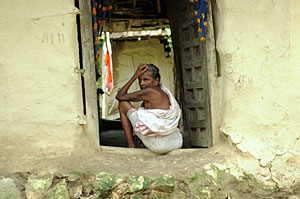 |
 PICS: BIKRAM RAI |
It was only after the Maoists agreed to support the formation of an autonomous Madhes with the right to self-determination that the Front joined the government, barely hours before the CA was to vote for a new prime minister. Things couldn't have worked out better for the Madhesi Front, which now has half the portfolios in government, most of them key ministries.
The demand for 'One Madhes' derives its rationale from CA's State Restructuring Committee's report and the Maoists have been pushing for ethnic federalism, so they couldn't refuse it.
 |
Surendra Labh, Janakpur-based scholar and lecturer told us last week: "The call for a united Madhes, was misinterpreted as a call for one Madhes". Other Madhesi academics and civil society leaders say federal provinces that isolate the plains from the hills and mountains would create even more economic imbalance.
Rajbiraj-based lawyer Himmat Singh puts it bluntly: "If we separate the Madhes from rest of the country, there will be nothing left."
 |
Besides the economic and political challenges of the Tarai, however, there is the added problem of population explosion fuelled by high birthrates, and migration from both India and the hills. Deforestation of the Chure hills in the past four years have worsened floods, and sedimentation has raised river beds. Droughts and flash floods have made things worse for farmers here in the eastern Tarai.
A federal Madesh unit would have to depend on upstream provinces for water for irrigation and power for its industries. If federalism is not smooth, this could lead to future water wars.
 |
Experts based in the Tarai say the only way to ensure balanced economic growth into the future is to have districts within each province complement each other. Electricity generated from hydropower projects in Dolakha district of Janakpur Zone could help in the industrialisation of its Tarai districts like Dhanusha. Even when it comes to tourism, the potential of Lumbini and Janakpur are linked to pilgrim arrivals in Swayambhu, Baudhha and Pashupati, and vice versa. Only with close economic and social linkages between mountain, hill and plains, can a federal Nepal be stronger than the sum of its parts, they add.
 |
But Madhesi leaders are engaged in populist identity politics that overwhelming numbers of people in the Madesh themselves don't agree with. Identity without progress and dignity without development will, it seems, neither benefit the Madhesi population nor help unleash development that geographically integrated provinces can.
Because their political rhetoric has now become so strident, Madhesi leaders have painted themselves into a corner and can't moderate their views even if they want to. The Kathmandu establishment, including Madhesi leaders at the centre) cannot ignore the identity and dignity of the Madhesis any longer. And many in the Madhes are convinced that a united federal Madhes will actually make them poorer.
My son died in vain
RANI DEVI MAHATO in SIRAHA
 |
We invested our hard-earned money to educate our son, so that he would grow up to become a learned man one day. But he became the first martyr of the Madhes movement four years ago. Many others lost their children and we consoled ourselves that maybe our son's blood will bring prosperity to this land. But the leaders have shown disregard and disrespect to our children's sacrifice.
Once Upendra Yadav came and made promises, which he never kept. Rajendra Mahato got my younger son a job in Biratnagar. But the leaders are so greedy, they even took 1 lakh out of the compensation money that the government paid us, saying they need it to build a statue of my son. The Madhes movement opened the door for our leaders to get into government and fill their pockets.
I watch all this, and I feel my son died in vain. If he was alive, he may have gone abroad and sent us money. The next time Madhesi leaders come to my door for votes, they will have to first account for my son's death. I know they will come sooner than later.
Rani Devi's son Ramesh Mahato was killed by Maoists in Lahan during the 2007 Madhes movement.
Read also:
Gajanan to Baburam, EDITORIAL


